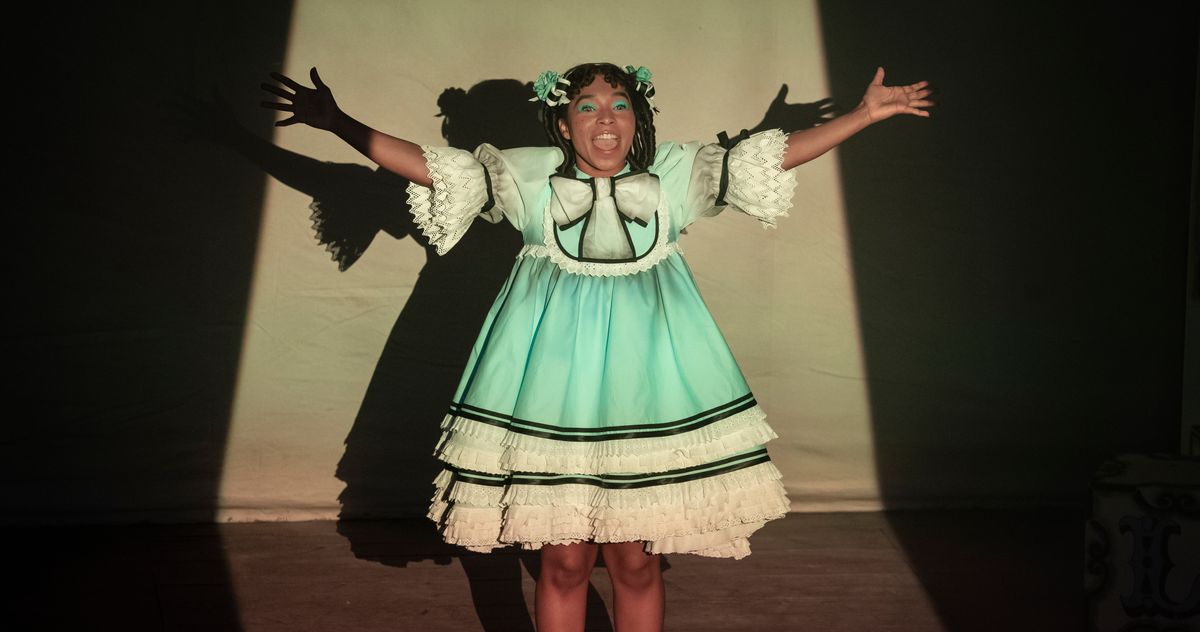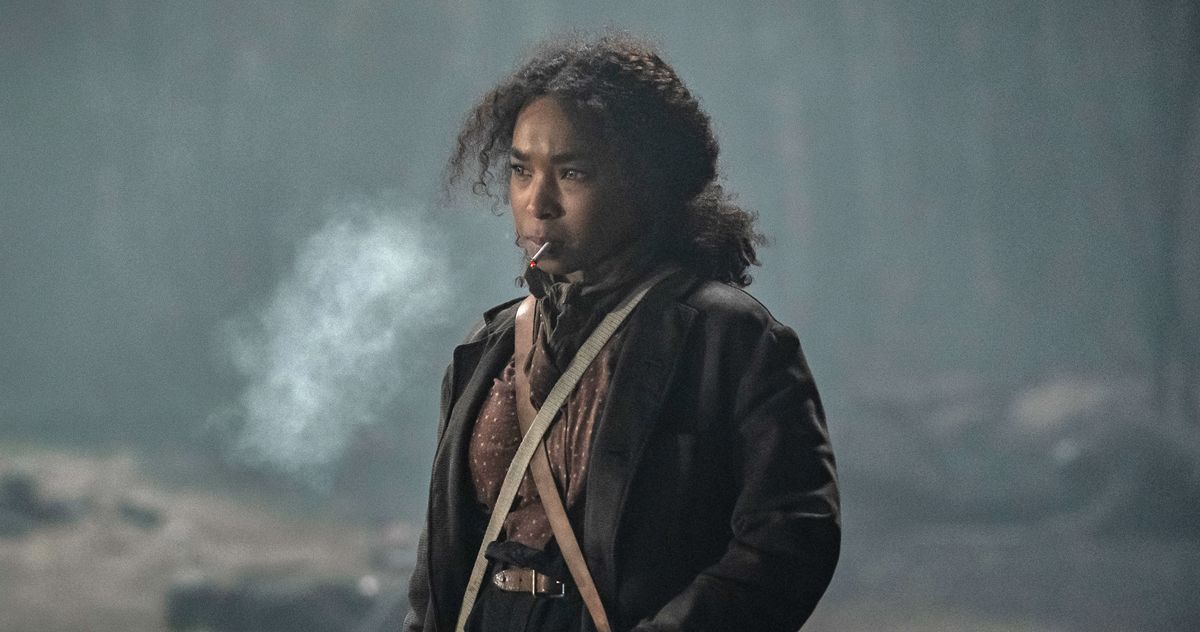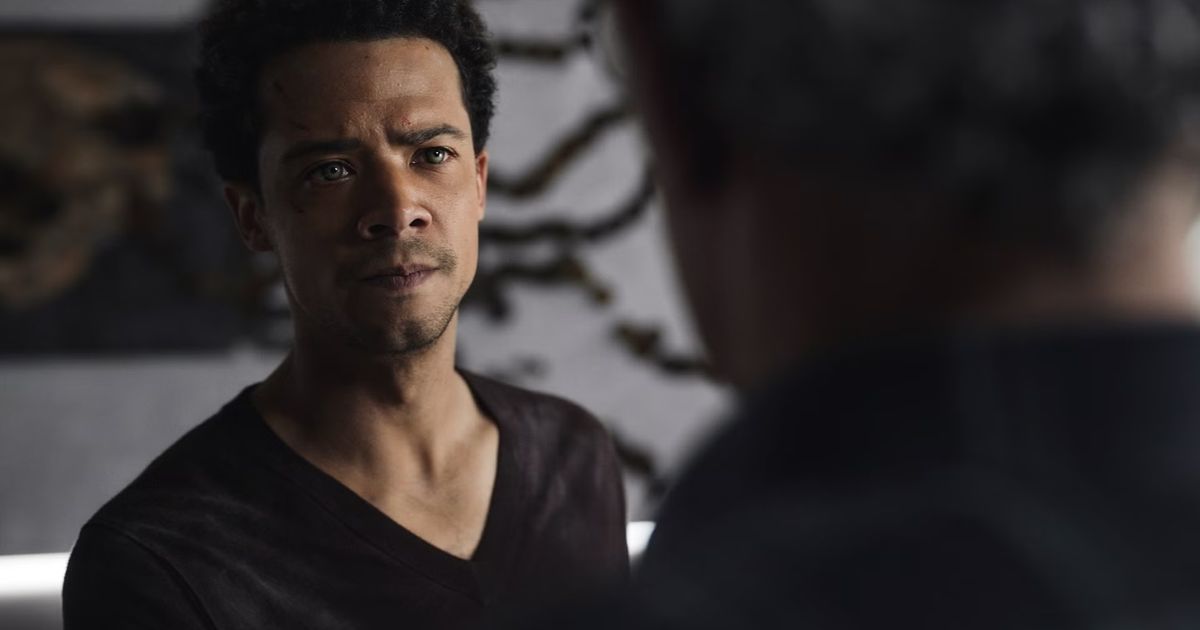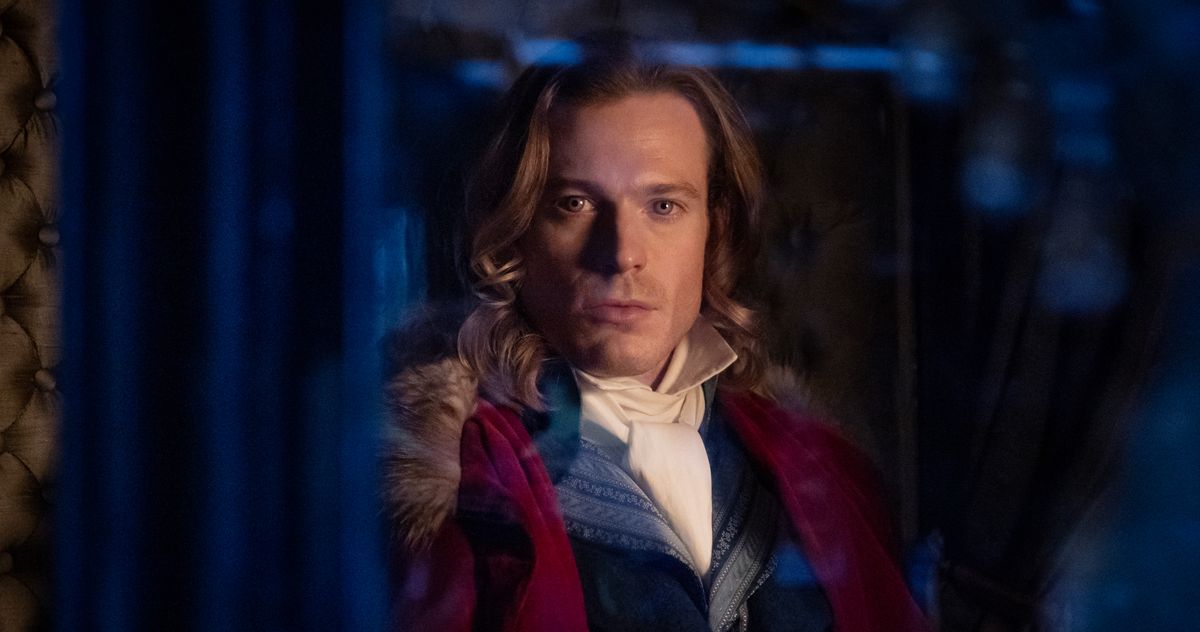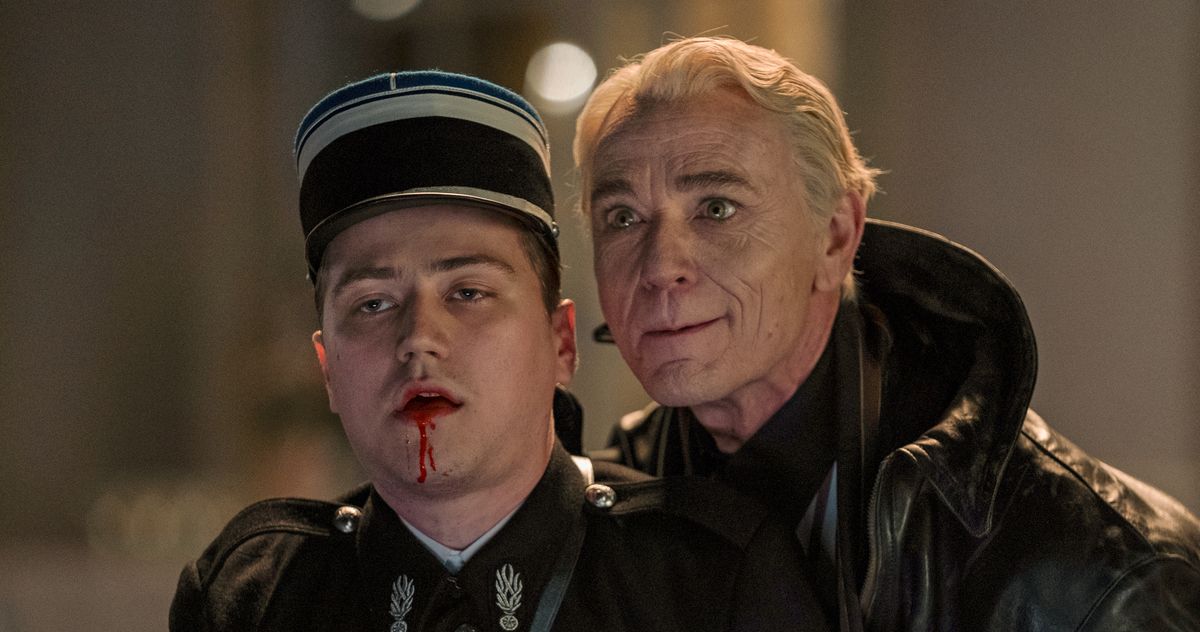Photo: Larry Horricks/AMC
“I Don’t Like Windows When They’re Closed” has to be the most infectious 1940s earworm since “Boogie Woogie Bugle Boy (Of Company B).” Call me RFK Jr. because I cannot for the life of me get this brain-eating worm out of my skull. IWTV writers, you’re sick for this. The latest episode of Interview With the Vampire opens on the play promised to Claudia during last week’s initiation, and, oh wow, is this thing demented. “My Baby Loves Windows” falls somewhere in the dark nether-realm between Shirley Temple and Whatever Happened to Baby Jane? with a dash of Struwwelpeter gore. Claudia plays Lulu, a little girl in curls and bows and drawn-on freckles who thinks she’s a bird and, when her governess and mother aren’t looking, jumps out the window ,and dies, splat on the pavement. This insipid ditty is repeated around four times in the episode (in English and French), which really effectively communicates how Claudia feels like a prisoner in her body and her coven, being subjected to nightly torture.
And, of course, all of Paris, sick fucks that they are, love the show, making it a hit, singing along, and buying souvenirs. The real diehards show up in Baby Lu costumes and makeup and sit in the fake-blood splash zone up front like it’s Blue Man Group. “We even added back a Wednesday French performance,” Armand tells Daniel. It’s hilarious to hear how this all-powerful vampire, 70 years after the fact, is still hung up on the show doing boffo box office. He held onto a copy of the script, marked up in red pen, and Daniel reads out one of his catty directorial notes: “Claudia, if you do absolutely nothing else, at least enunciate.” But Claudia is bored. She spells it out plainly: “I’m a fierce vampire trapped in the body of a little girl,” and she’s reminded of that every night as she dances in her bobby socks for crowds to laugh at her. “I have lost my passion for work onstage. I think I’d prefer backstage work,” she tells Armand in front of the whole company after the show.
If her boredom manifests in a dispassion for the performing arts (again, so silly and fun that this is so key to the story), Armand’s centuries of boredom, commingling with paranoia, manifests by taking the coven’s theatrical output way too seriously, despite it ostensibly all being a front for their nightly murdering. Like a cult leader, he needs his flock to totally buy into the ritual of the Theatre des Vampires, as a mark of their devotion. But, a year and a half after the American vampires made themselves known, there are stirrings of discontent and talk of unfair treatment amidst the vamps, as Louis has been allowed to hang around at his leisure without buying into the coven at all. Santiago asks the lovers plainly: “Are you companions?” Armand immediately says “yes,” while Louis reflexively says “no.” Very juicy, very awkward.
Back at Louis’s flat, the two are quibbling about labels post-coitus. Louis remains commitment-shy after his toxic relationship with Lestat, but that’s not easy for Armand, who wants more from whatever it is they’re doing, especially because he’s still keeping Louis and Claudia’s secret about their Lestat origin story. Throughout all of this, Louis is still hallucinating ghost-Lestat, who notes, “Do you notice how hot the room gets when you two talk about the ‘secret’?” Devilish stuff.
Daniel interrupts at this moment, asking, “Are you schizophrenic, Louis?” It’s as if to say, I can accept vampires being real, but you imagining your ex-lover is a step too far. Armand says he didn’t realize Louis was experiencing these memories of Lestat quite so viscerally during their courtship, and now he’s on edge. When Daniel asks about a fire that burned down the Theatre des Vampires, Armand is completely thrown. It seems that this fire was not within the scope of pre-approved intel Armand had intended for Daniel; he learned about it from an old newspaper clipping in the Talamasca files, courtesy of computer hacker extraordinaire Raglan James (which sounds like a guy who opens for Jason Mraz on tour). When Armand is simmering, Daniel has more disturbing flashbacks of Armand all up in his face, rummaging through his brain. This scares Daniel off from that line of questioning.
Back in the past, Armand has sentenced Claudia to the Jared Leto Method™ of staying in costume 24/7. That’s how Santiago finds her in the wet room: all dolled up, amid the grisly sounds of rats gnawing on a human heart, writing in her diary that she’s hidden in one of the mausoleum wall-drawers (Google is telling me a mausoleum wall-drawer is called a “niche,” which is niche trivia). She keeps her Burn Book hidden because recording vampire history is No. 3 on the list of cardinal vampire sins, but she has oh so much shit to talk, and Santiago is just dying for some hot goss. He warns Claudia that she ought to be more clever in hiding her rule-breaking because when it comes to law enforcement, Armand won’t hesitate, bitch. Claudia tries to destroy the evidence by throwing her diary in the rat box, but Santiago reaches in and saves it, which is fun and disgusting. “Don’t be so melodramatic,” says Santiago, Paris’s most melodramatic creature. We also learn he has some sort of mega-speed-reading vampire powers?
At a big cast dinner in a restaurant where no one’s actually eating, kind of like the Cullens in the Forks High cafeteria, Santiago teases Louis and suggests he knows that Louis is lying about his backstory. Does he really have that good of an ear for American regional accents, or did he just get intel from Claudia’s journal? Louis literally grabs Santiago’s tongue and Armand does the time-freeze trick on the whole restaurant and the rest of the coven to yell at them. Between present-day and flashbacks, Armand is power-trippin’.
Back in Paris, Louis is in a mood because he’s spending all his time hanging out around creatives in human salons and galleries and feeling inadequate as an artist. Who among us hasn’t felt insecure around our cooler, more talented friends? Juste moi? A wealthy buyer tells Lou he doesn’t have what it takes, and later on in his dark room, he laments how photography is actually a really hard hobby for a vampire: You never get good lighting, and you can’t spend too much time getting to know a subject, or else you’ll eat them. This is why I love vampire stories. They’re always coming up with new, weird specificities about vamp-life. He sets a bunch of his photos aflame, using the fire-trick he’s been practicing under Armand. Interesting how Louis’s ties to humanity (i.e., art) are creative, generative; Armand’s vampiric isolationist influence (i.e., spontaneous fire-making) is destructive. In the present day, this is all still clearly a sore spot for Louis, and leads to a fight with Armand. Armand isn’t only toying with Daniel; it seems like he’s messing with Louis, too, slipping someone else’s photos into his portfolio. Is it a control thing? Gaslighting? Assuming he knows what’s best for Louis? Either way, red flag city.
The meatiest part of the episode, the thing that will have book fans flipping their lids, is Louis and Armand’s Night at the Museum date. Skulking around the Louvre with flashlights after dark, Armand brings Louis to a painting — Palma Vecchio’s Adoration of the Shepherds With a Donor — and reveals his own backstory. There’s a huge exposition dump here, and it’s done pretty artfully, thanks to Assad Zaman’s performance. The facts are: Armand was born Arun, and his parents sold him into slavery to a merchant ship captain in Delhi. He wound up in a brothel, abused until he was rescued at 15 by his maker, Marius de Romanus, who renamed him Amadeo and occasionally whored him out to friends. Still, Armand talks about him like he loved him deeply. He posed for the painting at 20, still a human, which puts his date of birth somewhere between 1500 and 1505. Marius only gave him the dark gift when he fell ill at 27. Later, the Roman coven burned Marius alive, renamed Amadeo Armand, and deployed him to run the Paris coven that Magnus, Lestat’s maker, had abandoned. I’ll need book readers to weigh in on just how many hundreds of pages of lore were synthesized in this monologue, but I’ll say this: The backstory shakes up Armand and Louis’s dynamic in a really interesting way, as human-Armand was a child abused in a brothel, and human-Louis ran one.
It’s a very sympathetic turn for Armand, but Louis is still upset with the way he treats Claudia — it’s giving insecure — and the mistreatment only gets worse as the episode goes on. Claudia has befriended the human dressmaker from episode two, Madeleine, who has a dark past of her own and an accepting, frank sense of humor. Armand loses his shit on her and threatens her. Claudia confronts Louis about this, and dick-stricken dummy he is, Louis just goes, “No, that doesn’t sound like him.”
“You and him! Him and you! You and fucking him! You picked another one over me!” says Claudia, who is right; Louis claims to love Claudia as a sister but keeps running around with boys who treat her horribly. It’s his weakness. Then, we get this strange, lovely scene where Louis breaks up for good with ghost-Lestat on a rainy park bench. Sam Reid does this great thing where he sort of lets it dawn over ghost-Lestat’s face that he knows Louis is going to mind-wipe him before he melts away in the rain. It’s a goofy effect but it’s IWTV; I’m not looking for realism. Armand takes his place on the bench and expresses his panic over “mutiny brewing” in the coven. Meanwhile, Santiago’s breaking into Louis’s apartment and has half the coven calling him maître. Louis says, basically, “Let him.” Then he calls Armand by his deadname, Arun, and Armand calls him maître. The dynamic-flip I mentioned two paragraphs ago? Oh, it’s on.
In the present day, Daniel clicks through the Talamasca files to find the victim name “Kathryn Mitchell, 1973,” and pap shots of Armand and a figure in a hoodie (Louis probs) dragging him down some steps. Daniel has more flashes of Armand mind-fucking with him and images of a body with a bag over their head. He plays an OG ’70s interview tape on his laptop and hears the sounds of vampire snarling and flesh-tearing and Armand’s voice interrupting the attack. What happened? I don’t want to read ahead in the books because I don’t want it spoiled. But things are getting weird, y’all.
• I love this episode’s focus on art. The painful point where talent does not live up to taste, patronage, the brutality in art commerce and exchange.
• Some great theater business up top. When Santiago gets his three-minute warning, he says, “Fuck you, three!” and gets up, at which point he sees Celeste/Estelle (I still don’t know who’s who) emerge from under the vanity where he was sitting wiping her lipstick. These horny vamps are incorrigible.
• Sam the Irish vamp remains a scene-stealer. Love him picking up a popcorn bag and a prophylactic from the cheap seats, and his little “Ah, yer grand” to Claudia from offscreen.
• “He reads books during Blood Sabbath!” If Lestat is “No one sucks like Gaston, no one fucks like Gaston”-coded, Louis is “No denying she’s a funny girl, that Belle.”
• All the business of Louis lighting a candle and ghost-Lestat lighting a cigarette off it and Louis blowing it out etc., etc., is very sexually charged in a film noir way almost.
• Love how Santiago admits to human relations with half the whores of Paris. I love the line “Tender turns to tinder.” The wet room remains a space for comedy.
• “Read my mind, grab my melons.” “Already doing it.”
• Louis says, “I suppose I can come across haughty.” The understatement of the century.
• Ben Daniels’s Louis impression sounds like Frank Underwood.
• Lestat eating a photo is sooooo funny.
• The shot of Armand in his stupid floppy mobster hat popping up behind the swastika graffiti to scare Claudia is good.
• More from mob boss Armand (to Santiago): “Too old to play Hamlet, too young to play Polonius. Know your role, thesp, or join your maker in oblivion!” RIP, “daddy vamp.”
• Santiago looks at Louis’s art-photos and just goes, “Wanker.”
• From the Talamasca files: Covens of NOTE, vampires sorted by paranormal qualities, aberrations, known liars. Roman Coven in Art, Architecture, and Design. A painting of Christ in the Marius file.




